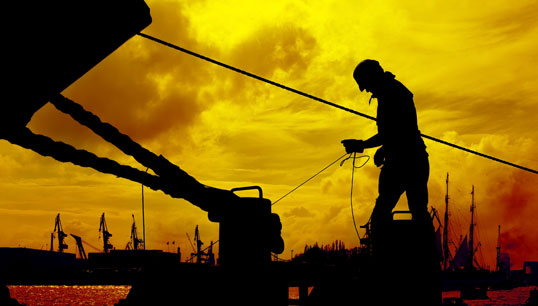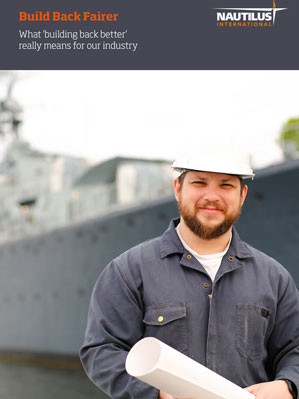
Build Back Fairer is a new Nautilus campaign which sets out a blueprint for a progressive and sustainable recovery from the pandemic, where seafarers are not left behind. Ben Powell reports
As normality following the pandemic and countries begin to roll back Covid restrictions, discussions are beginning to take place about how societies and economies will recover.
While the UK government talks about the need to 'build back better,' many Nautilus members are rightly asking: 'better for who?' Despite their efforts in keeping global trade moving through the most difficult period in recent history, maritime professionals were left brutally exposed by the international response to the coronavirus. Many seafarers are now questioning whether they want to continue to work in a career which has taken such a profound toll on their financial security and wellbeing.
The truth is that the pandemic did not create many of the problems that seafarers faced – it exacerbated longstanding issues in an industry that needs reform. Build Back Fairer is based around five key 'asks,' which taken collectively can deliver a better future for the industry, and a fairer future for the men and women at its core.
Seafarers recognised as key workers – now and forever
Key worker status was vital to ensure that seafarers could be provided with appropriate exemptions from national travel restrictions when joining or leaving their ships, to keep the world's maritime supply chains functioning.
However, despite a welcome United Nations General Assembly resolution in December 2020, only 58 states have thus far informed the International Maritime Organization (IMO) that they have designated seafarers as key workers.
In others, the key worker status was granted in name only and barriers have continued to be placed in the way of seafarers being able to exercise their fundamental rights.
As we look to a future beyond the immediate impact of the pandemic, it is likely that Covid-19 will remain in circulation for years to come in some form. It is also clear that other issues will arise – from infectious diseases to natural disasters – that may require some restriction in the global movement of people.
Therefore, the Union is lobbying for an enduring international agreement that seafarers will continue to be designated as key workers.
Coupled with this, Nautilus is calling on the UK government to formally endorse the joint statement made by the European Transport Workers’ Federation (ETF) and European Community Shipowners’ Associations (ECSA) on the specific rights and entitlements that seafarers should enjoy everywhere as key workers.
Fair workplaces with decent working conditions
The pandemic both exposed and exacerbated longstanding issues with employment practices in the maritime industry.
A raft of international agreements, including the MLC, were set aside in the face of coronavirus restrictions. But even in normal circumstances, in the cutthroat shipping business where a race to bottom is driven by flags of convenience, what were intended as minimum standards rapidly become maximum standards.
The impact of all of this has led to seafarers asking themselves whether they really want to work in an industry where their fundamental rights could be so freely disregarded.
Nautilus is therefore calling for the Maritime 2050 aim to combat seafarer fatigue to be accelerated. This should include the UK government using its influence to push for:
- the eradication of six-on/six-off shift patterns
- ensuring that legal limits on maximum hours of work and minimum hours of rest are enhanced and enforced, along with maximum tour lengths and paid leave
- the recommendations of the World Maritime University report, 'a culture of adjustment' to be adopted in full
The Union is also calling on the government to continue working towards ending social dumping: the employment of foreign labour in UK waters on the rates of pay of their country of origin.
A new era of accountability and transparency
If we are genuine about building a better and fairer maritime industry, a frank and open appraisal of the governance and structure of the shipping industry and the corrosive effect of flags of convenience is more necessary now than ever.
This presents an opportunity for the UK to show leadership in leading global efforts for reform. A new era of accountability and transparency would help to end the race to the bottom on seafarers' rights and enable the UK shipping industry to compete on a fair footing with the rest of the world.
Nautilus is calling for the UK to instigate a global review of ship registration practices to tighten up ship registration and reinforce UNCLOS Article 91, which requires a genuine link between the shipowner and the country of registration.
The UK government should also ensure that shipping is not excluded from the Organisation for Economic Cooperation and Development (OECD) consideration of a global minimum tax for multinational corporations.
A fair transition to green technology and automation
The transition from fossil fuels to renewable energy, and the development of new technology accelerating the pace of automation both present opportunities along with considerable challenges.
The focus of the UK government and the maritime industry regarding these issues must be person-centred, and focused on creating high-value work in a way which does not negatively affect the current workforce.
Nautilus is calling on the UK government to reaffirm its commitment to a just transition to ensure that opportunities presented by the green agenda work for the benefit of seafarers and maritime professionals. The government should also work with industry and unions to develop a human-centred maritime automation strategy, focused on the role that new technology can play in enhancing seafarers’ welfare and living and working conditions.
Fair access to quality jobs and training opportunities
The number of British seafarers has declined by almost two thirds since the 1980s, and the current gap between numbers due to retire and numbers of new entrants means a further 30% decline can be expected within the next decade.
There is no shortage of young people wishing to embark on a maritime career, with applications for cadetships and ratings apprenticeships far outstripping the number of vacancies. The problem is the lack of opportunity and commitment from shipping companies, and the commoditisation of seafarer training and employment.
Therefore, the government must do more to develop the sector, support the creation of new training and employment opportunities, and provide incentives to ensure that shipowners commit to provide opportunities for employment for UK seafarers.
Nautilus is calling on the UK government to:
- increase investment in the Support for Maritime Training (SMarT) scheme to cover 100% of the cost of training UK-resident seafarers and require a commitment from employers to guarantee a period of employment on completion of a cadetship
- improve the UK Tonnage Tax scheme so that it helps grow the UK flag by establishing a mandatory flag link, increases employment and training of UK seafarers and contributes to the government’s environmental objectives
- promote access to maritime careers for people from all backgrounds and equal opportunities to career progression for all maritime professionals
- support networks which provide safe spaces for women seafarers and other under-represented groups and discuss how to increase diversity in the maritime sector
- examine the scope for 'cabotage' protection of domestic shipping and intra-EU ferry trades to increase economic resilience and create UK seafarer jobs

Build Back Fairer manifesto
Read the full campaign document in the Resources section of the Nautilus website. What 'building back better' really means for our industry.
Tags
